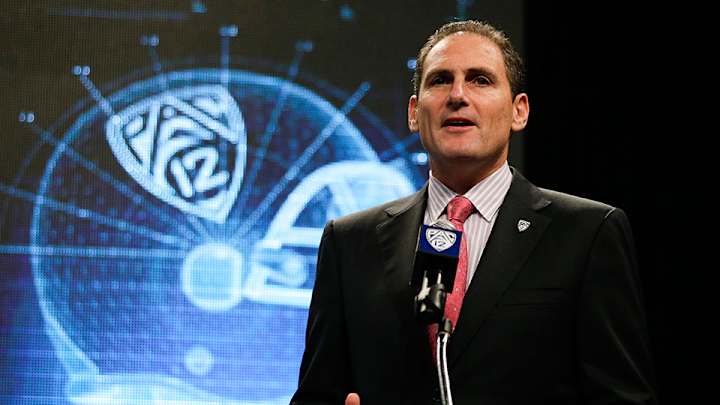Commissioner not sure if Pac-12 will adopt SEC transfer policy

CORVALLIS — For 16 years, Brenda Tracy felt bad that she didn’t choose to prosecute.
In the aftermath of a brutal gang rape in which Tracy says she was attacked by four men, including two Oregon State football players, Tracy, then a 24-year-old visiting Corvallis, says she “didn’t feel strong enough,” to sit on a witness stand and repeat her story multiple times. She wanted justice, but didn’t feel supported by her community. Now, as a 41-year old, she wants to do everything she can to prevent it from happening again—and she wants Pac-12 presidents and athletic directors to help her.
Tracy’s story came to light a year ago, when The Oregonian published her detailed account—and followed up with its own investigation—of a gang rape that occurred in 1998 at a Corvallis apartment and involved the arrest of former OSU players Calvin Carlyle and Jason Dandridge. Michael Ainsworth, a recruit from California, was also named as a suspect. Tracy told the paper she was visiting Corvallis with a friend one night when she was “gang raped, sodomized, robbed and then, re-victimized—her word—when a college football coach suspended two of the players for one game and was quoted as saying his players had made, ‘a bad choice.’”
Breaking down the SEC's new rule for incoming transfers; Punt, Pass & Pork
Tracy has since made peace with Mike Riley, the Oregon State coach who made that comment. In the aftermath of The Oregonian’s reporting, Riley initiated a conversation with Tracy, and asked her to speak with his team. Riley left for Nebraska in December; Tracy says he has invited her to speak in Lincoln. But Tracy, now a registered nurse who lives outside of Portland, says she wants to use her story “to try to change things in my community, my state or maybe even my nation.” She’d like to start with her conference.
Earlier this month, Tracy emailed every Pac-12 president and athletic director, urging the conference to pass a rule that bans teams from accepting recruits or transfers who have a history of serious misconduct, such as sexual assault and domestic violence.
In her emails, which she shared with SI.com, Tracy wrote that such a rule would “protect our universities, athletic departments and athletes,” while “increasing the safety for our communities and students.” She added, “As a survivor of rape and a concerned citizen I would urge to you please vote to adopt this very important ruling. You have the power to save someone else from going through what I did.”
In May, the SEC passed legislation that banned schools from accepting transfers who were dismissed from previous schools for serious misconduct such as “sexual assault, domestic violence or other forms of sexual violence.” The Big 12 is considering a similar rule that would include both transfers and incoming recruits.
Big 12 may discuss adopting SEC transfer policy after Baylor scandal
Pac-12 commissioner Larry Scott, in Corvallis Friday night for the Oregon State-Stanford game, said he’s not sure right now if the Pac-12 should pass a similar rule. “It’s very unusual for the conference to get involved with standards or discipline with something happening outside the sphere of competition,” Scott told SI.com. “Right now our schools want to determine, individually, what the standard should be for accepting a transfer or not. But if one of the presidents wants to put it on the table [at our next meeting], we’ll talk about it.”
Scott said he was not “that familiar” with Tracy’s story and that he had not seen an email from her. (In an email to Tracy, Oregon State president Ed Ray said he supported the intent of the SEC and Big 12 rule changes, and that he wanted to talk about it with fellow athletic directors and presidents; Ray copied Scott on the email.) Scott added that the nationwide issue of sexual assault and sexual harassment on campuses is “troubling,” but that he’s pleased with how Pac-12 universities are responding, pointing out the Pac-12’s support for the “It’s On Us” campaign.
“It’s troubling to anyone that’s looked at it, but it’s way beyond an athletics issue,” Scott said. “That’s why, up to now, it’s best fit as a campus issue. We’ve not looked at what the SEC has done. But it sounds like it’ll come up.”
Pac-12 athletic directors are scheduled to meet in San Francisco in late October; presidents meet in November. Tracy told SI.com she has already received emails of support back from administrators at Oregon, Arizona State and UCLA.
“I don’t want to ban football,” Tracy said. “I think sports are great, they changed my life. But I don’t think we should be taking anybody into our campuses who have a history of this. We shouldn’t prioritize athletic ability over someone who might be a danger to students.”
